Personal Locus of Control: Strategies for Stress Management and Goals
VerifiedAdded on 2021/05/30
|7
|1518
|166
Essay
AI Summary
This essay delves into the concept of locus of control and its impact on stress management and the pursuit of academic goals. It identifies common stressors such as academic pressure, balancing social life, heavy workloads, financial challenges, and future anxieties. The author outlines various coping strategies employed to mitigate these stressors, including positive thinking, balancing social and academic life, time management, physical exercise, financial planning, and acceptance of the unknown. Furthermore, the essay examines the cognitive, behavioral, decisional, and informational domains, highlighting how each contributes to achieving a mean grade of A. The author emphasizes the importance of positive information, well-organized thoughts, proactive decision-making, and consistent positive behavior in managing stress and fostering academic success. The essay references scholarly articles to support the claims.
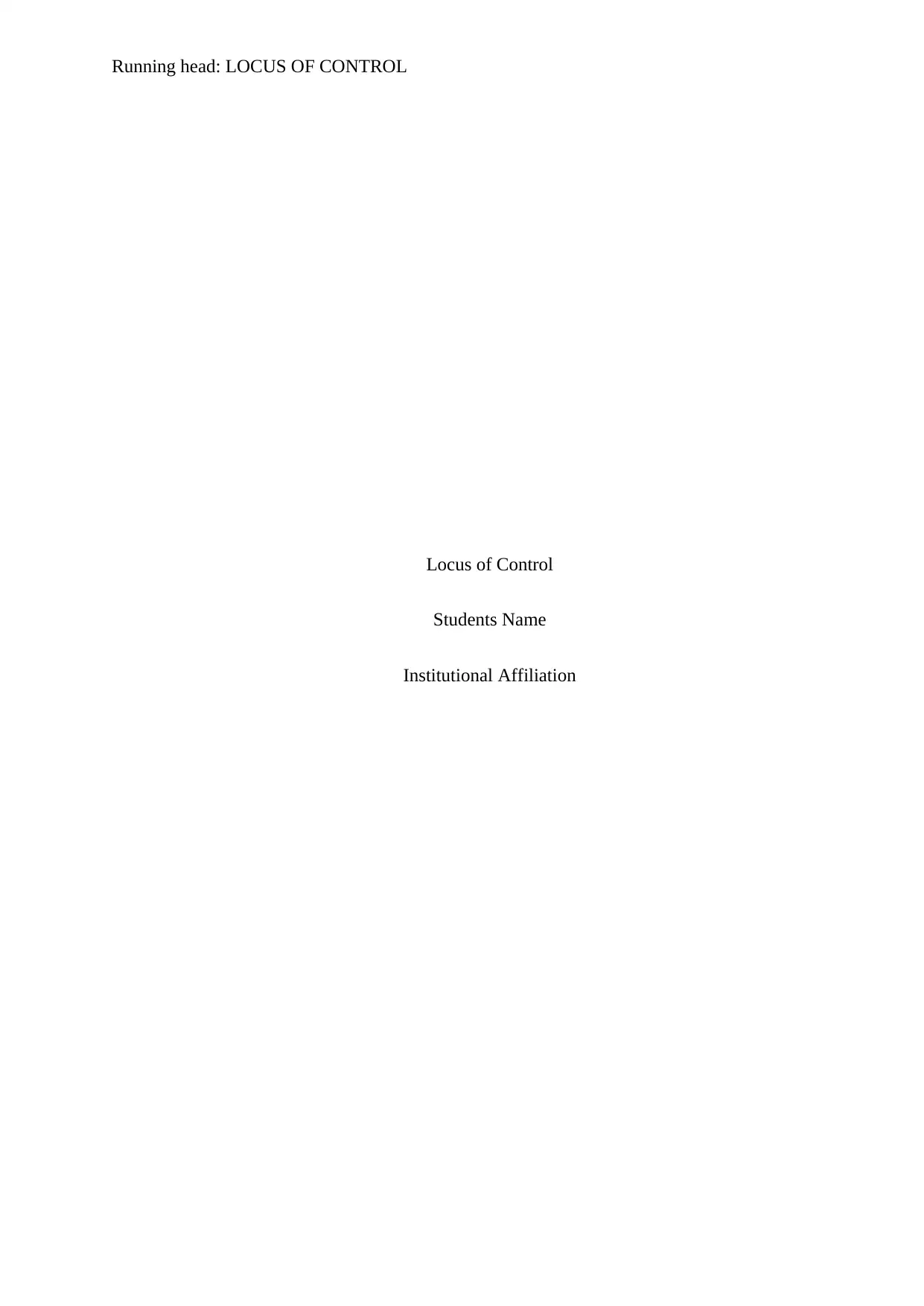
Running head: LOCUS OF CONTROL
Locus of Control
Students Name
Institutional Affiliation
Locus of Control
Students Name
Institutional Affiliation
Paraphrase This Document
Need a fresh take? Get an instant paraphrase of this document with our AI Paraphraser
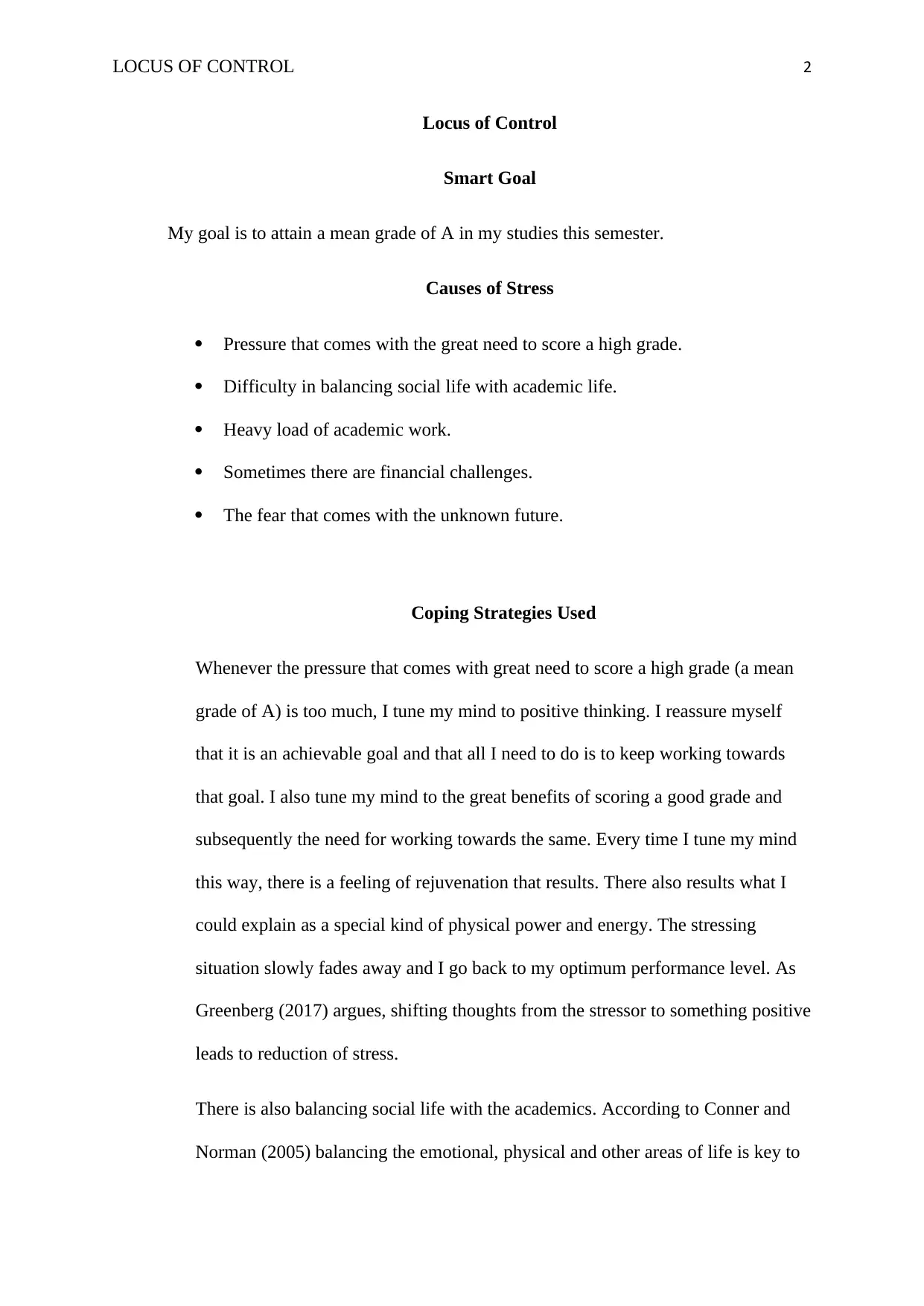
LOCUS OF CONTROL 2
Locus of Control
Smart Goal
My goal is to attain a mean grade of A in my studies this semester.
Causes of Stress
Pressure that comes with the great need to score a high grade.
Difficulty in balancing social life with academic life.
Heavy load of academic work.
Sometimes there are financial challenges.
The fear that comes with the unknown future.
Coping Strategies Used
Whenever the pressure that comes with great need to score a high grade (a mean
grade of A) is too much, I tune my mind to positive thinking. I reassure myself
that it is an achievable goal and that all I need to do is to keep working towards
that goal. I also tune my mind to the great benefits of scoring a good grade and
subsequently the need for working towards the same. Every time I tune my mind
this way, there is a feeling of rejuvenation that results. There also results what I
could explain as a special kind of physical power and energy. The stressing
situation slowly fades away and I go back to my optimum performance level. As
Greenberg (2017) argues, shifting thoughts from the stressor to something positive
leads to reduction of stress.
There is also balancing social life with the academics. According to Conner and
Norman (2005) balancing the emotional, physical and other areas of life is key to
Locus of Control
Smart Goal
My goal is to attain a mean grade of A in my studies this semester.
Causes of Stress
Pressure that comes with the great need to score a high grade.
Difficulty in balancing social life with academic life.
Heavy load of academic work.
Sometimes there are financial challenges.
The fear that comes with the unknown future.
Coping Strategies Used
Whenever the pressure that comes with great need to score a high grade (a mean
grade of A) is too much, I tune my mind to positive thinking. I reassure myself
that it is an achievable goal and that all I need to do is to keep working towards
that goal. I also tune my mind to the great benefits of scoring a good grade and
subsequently the need for working towards the same. Every time I tune my mind
this way, there is a feeling of rejuvenation that results. There also results what I
could explain as a special kind of physical power and energy. The stressing
situation slowly fades away and I go back to my optimum performance level. As
Greenberg (2017) argues, shifting thoughts from the stressor to something positive
leads to reduction of stress.
There is also balancing social life with the academics. According to Conner and
Norman (2005) balancing the emotional, physical and other areas of life is key to
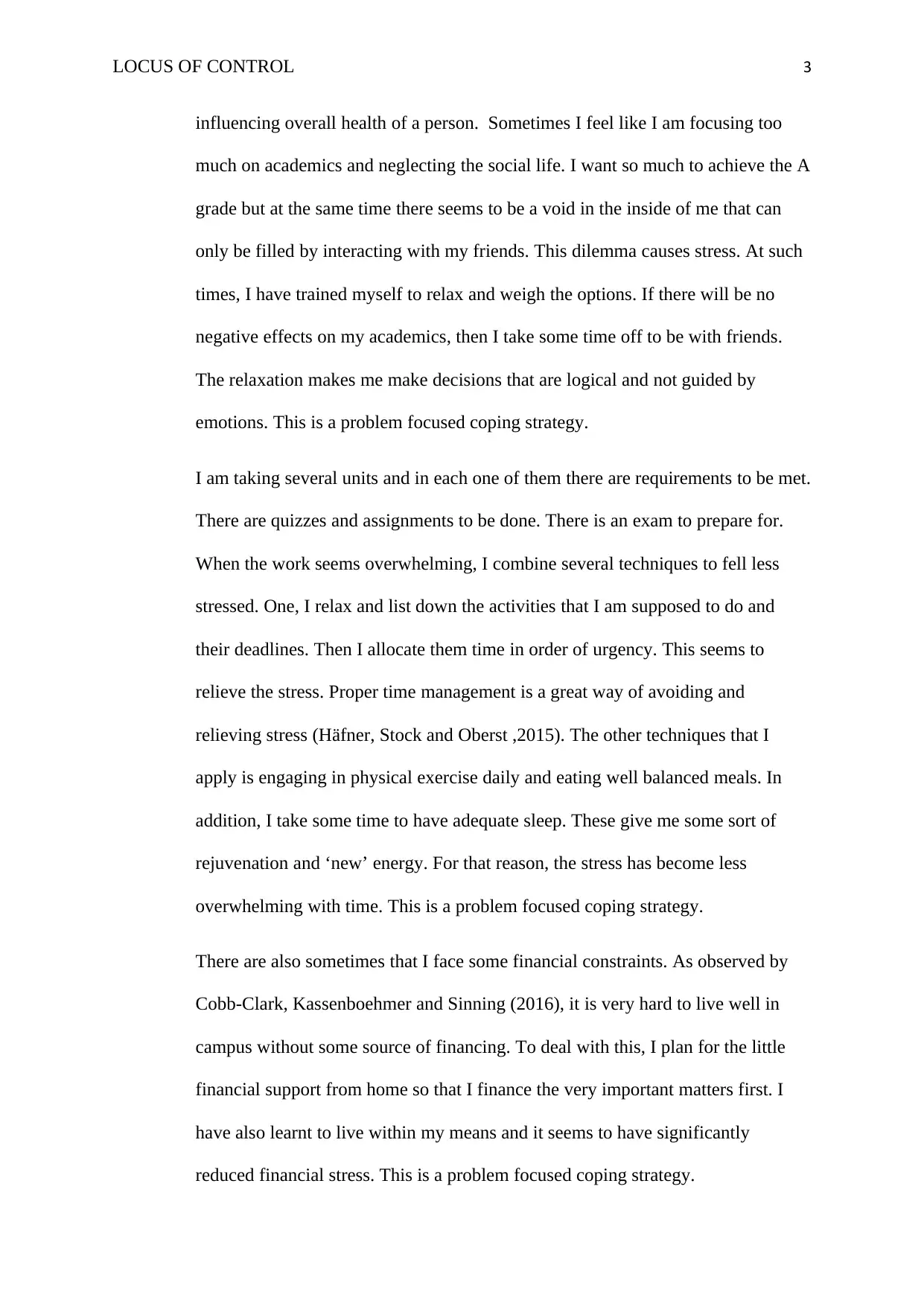
LOCUS OF CONTROL 3
influencing overall health of a person. Sometimes I feel like I am focusing too
much on academics and neglecting the social life. I want so much to achieve the A
grade but at the same time there seems to be a void in the inside of me that can
only be filled by interacting with my friends. This dilemma causes stress. At such
times, I have trained myself to relax and weigh the options. If there will be no
negative effects on my academics, then I take some time off to be with friends.
The relaxation makes me make decisions that are logical and not guided by
emotions. This is a problem focused coping strategy.
I am taking several units and in each one of them there are requirements to be met.
There are quizzes and assignments to be done. There is an exam to prepare for.
When the work seems overwhelming, I combine several techniques to fell less
stressed. One, I relax and list down the activities that I am supposed to do and
their deadlines. Then I allocate them time in order of urgency. This seems to
relieve the stress. Proper time management is a great way of avoiding and
relieving stress (Häfner, Stock and Oberst ,2015). The other techniques that I
apply is engaging in physical exercise daily and eating well balanced meals. In
addition, I take some time to have adequate sleep. These give me some sort of
rejuvenation and ‘new’ energy. For that reason, the stress has become less
overwhelming with time. This is a problem focused coping strategy.
There are also sometimes that I face some financial constraints. As observed by
Cobb-Clark, Kassenboehmer and Sinning (2016), it is very hard to live well in
campus without some source of financing. To deal with this, I plan for the little
financial support from home so that I finance the very important matters first. I
have also learnt to live within my means and it seems to have significantly
reduced financial stress. This is a problem focused coping strategy.
influencing overall health of a person. Sometimes I feel like I am focusing too
much on academics and neglecting the social life. I want so much to achieve the A
grade but at the same time there seems to be a void in the inside of me that can
only be filled by interacting with my friends. This dilemma causes stress. At such
times, I have trained myself to relax and weigh the options. If there will be no
negative effects on my academics, then I take some time off to be with friends.
The relaxation makes me make decisions that are logical and not guided by
emotions. This is a problem focused coping strategy.
I am taking several units and in each one of them there are requirements to be met.
There are quizzes and assignments to be done. There is an exam to prepare for.
When the work seems overwhelming, I combine several techniques to fell less
stressed. One, I relax and list down the activities that I am supposed to do and
their deadlines. Then I allocate them time in order of urgency. This seems to
relieve the stress. Proper time management is a great way of avoiding and
relieving stress (Häfner, Stock and Oberst ,2015). The other techniques that I
apply is engaging in physical exercise daily and eating well balanced meals. In
addition, I take some time to have adequate sleep. These give me some sort of
rejuvenation and ‘new’ energy. For that reason, the stress has become less
overwhelming with time. This is a problem focused coping strategy.
There are also sometimes that I face some financial constraints. As observed by
Cobb-Clark, Kassenboehmer and Sinning (2016), it is very hard to live well in
campus without some source of financing. To deal with this, I plan for the little
financial support from home so that I finance the very important matters first. I
have also learnt to live within my means and it seems to have significantly
reduced financial stress. This is a problem focused coping strategy.
⊘ This is a preview!⊘
Do you want full access?
Subscribe today to unlock all pages.

Trusted by 1+ million students worldwide
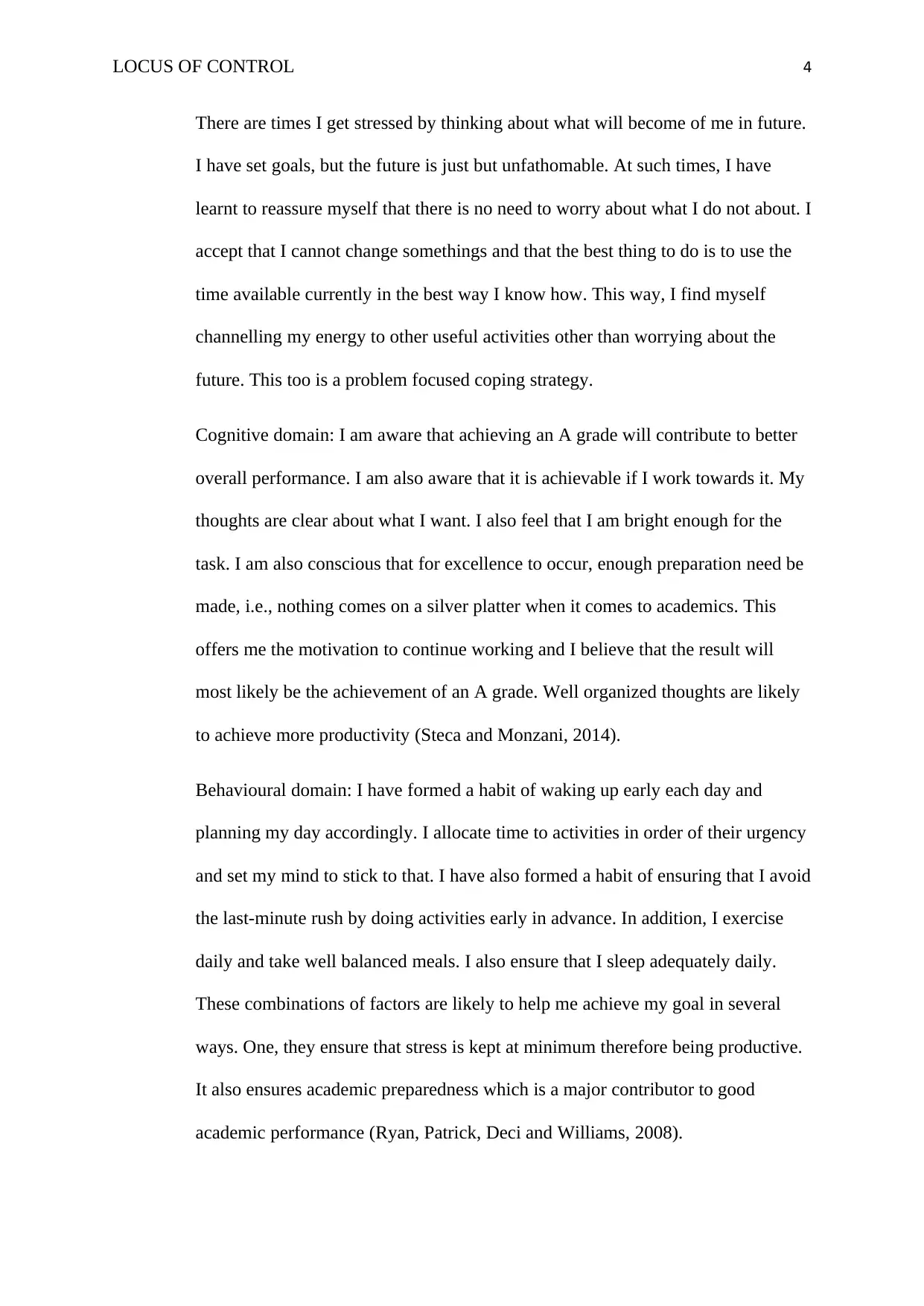
LOCUS OF CONTROL 4
There are times I get stressed by thinking about what will become of me in future.
I have set goals, but the future is just but unfathomable. At such times, I have
learnt to reassure myself that there is no need to worry about what I do not about. I
accept that I cannot change somethings and that the best thing to do is to use the
time available currently in the best way I know how. This way, I find myself
channelling my energy to other useful activities other than worrying about the
future. This too is a problem focused coping strategy.
Cognitive domain: I am aware that achieving an A grade will contribute to better
overall performance. I am also aware that it is achievable if I work towards it. My
thoughts are clear about what I want. I also feel that I am bright enough for the
task. I am also conscious that for excellence to occur, enough preparation need be
made, i.e., nothing comes on a silver platter when it comes to academics. This
offers me the motivation to continue working and I believe that the result will
most likely be the achievement of an A grade. Well organized thoughts are likely
to achieve more productivity (Steca and Monzani, 2014).
Behavioural domain: I have formed a habit of waking up early each day and
planning my day accordingly. I allocate time to activities in order of their urgency
and set my mind to stick to that. I have also formed a habit of ensuring that I avoid
the last-minute rush by doing activities early in advance. In addition, I exercise
daily and take well balanced meals. I also ensure that I sleep adequately daily.
These combinations of factors are likely to help me achieve my goal in several
ways. One, they ensure that stress is kept at minimum therefore being productive.
It also ensures academic preparedness which is a major contributor to good
academic performance (Ryan, Patrick, Deci and Williams, 2008).
There are times I get stressed by thinking about what will become of me in future.
I have set goals, but the future is just but unfathomable. At such times, I have
learnt to reassure myself that there is no need to worry about what I do not about. I
accept that I cannot change somethings and that the best thing to do is to use the
time available currently in the best way I know how. This way, I find myself
channelling my energy to other useful activities other than worrying about the
future. This too is a problem focused coping strategy.
Cognitive domain: I am aware that achieving an A grade will contribute to better
overall performance. I am also aware that it is achievable if I work towards it. My
thoughts are clear about what I want. I also feel that I am bright enough for the
task. I am also conscious that for excellence to occur, enough preparation need be
made, i.e., nothing comes on a silver platter when it comes to academics. This
offers me the motivation to continue working and I believe that the result will
most likely be the achievement of an A grade. Well organized thoughts are likely
to achieve more productivity (Steca and Monzani, 2014).
Behavioural domain: I have formed a habit of waking up early each day and
planning my day accordingly. I allocate time to activities in order of their urgency
and set my mind to stick to that. I have also formed a habit of ensuring that I avoid
the last-minute rush by doing activities early in advance. In addition, I exercise
daily and take well balanced meals. I also ensure that I sleep adequately daily.
These combinations of factors are likely to help me achieve my goal in several
ways. One, they ensure that stress is kept at minimum therefore being productive.
It also ensures academic preparedness which is a major contributor to good
academic performance (Ryan, Patrick, Deci and Williams, 2008).
Paraphrase This Document
Need a fresh take? Get an instant paraphrase of this document with our AI Paraphraser
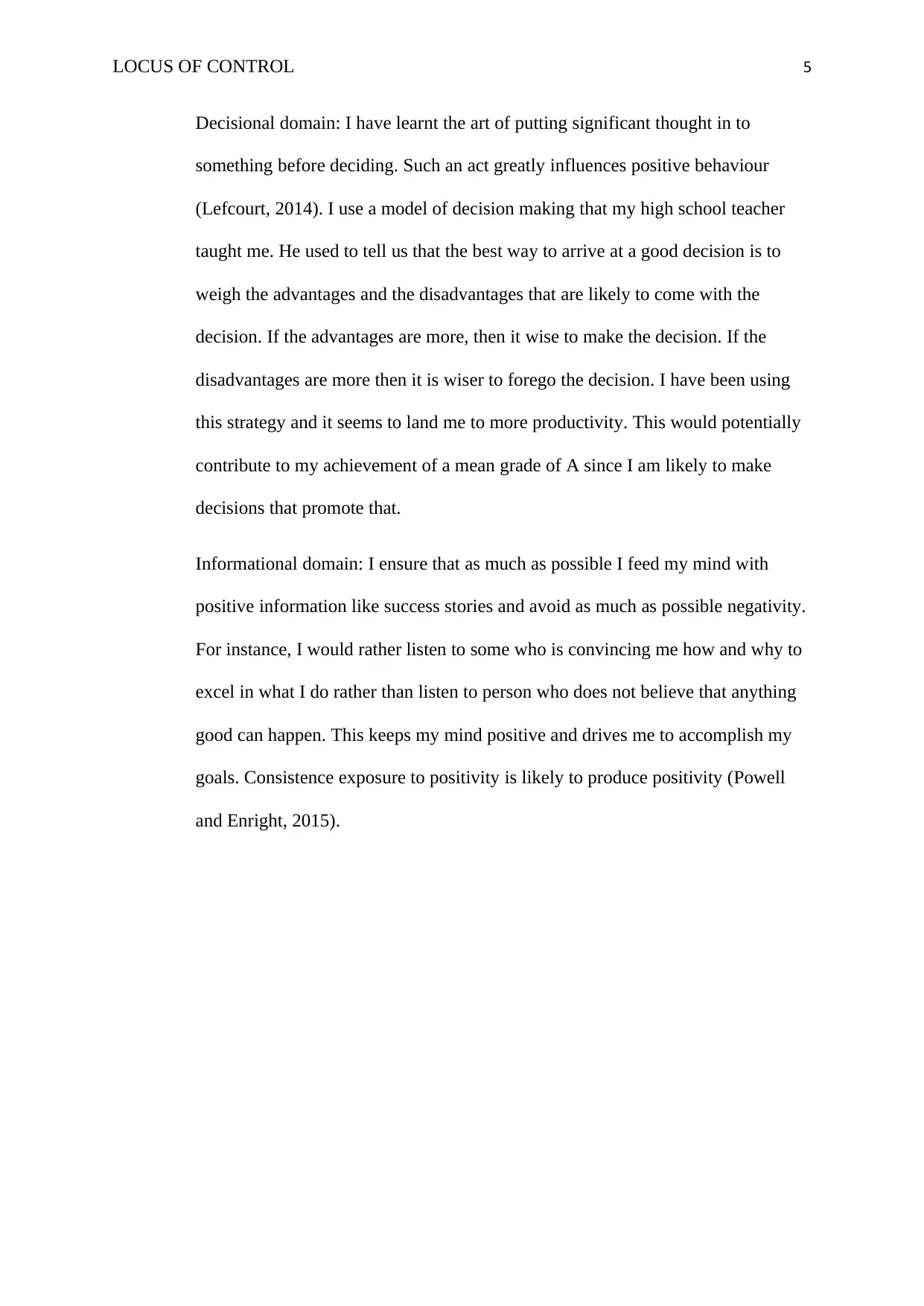
LOCUS OF CONTROL 5
Decisional domain: I have learnt the art of putting significant thought in to
something before deciding. Such an act greatly influences positive behaviour
(Lefcourt, 2014). I use a model of decision making that my high school teacher
taught me. He used to tell us that the best way to arrive at a good decision is to
weigh the advantages and the disadvantages that are likely to come with the
decision. If the advantages are more, then it wise to make the decision. If the
disadvantages are more then it is wiser to forego the decision. I have been using
this strategy and it seems to land me to more productivity. This would potentially
contribute to my achievement of a mean grade of A since I am likely to make
decisions that promote that.
Informational domain: I ensure that as much as possible I feed my mind with
positive information like success stories and avoid as much as possible negativity.
For instance, I would rather listen to some who is convincing me how and why to
excel in what I do rather than listen to person who does not believe that anything
good can happen. This keeps my mind positive and drives me to accomplish my
goals. Consistence exposure to positivity is likely to produce positivity (Powell
and Enright, 2015).
Decisional domain: I have learnt the art of putting significant thought in to
something before deciding. Such an act greatly influences positive behaviour
(Lefcourt, 2014). I use a model of decision making that my high school teacher
taught me. He used to tell us that the best way to arrive at a good decision is to
weigh the advantages and the disadvantages that are likely to come with the
decision. If the advantages are more, then it wise to make the decision. If the
disadvantages are more then it is wiser to forego the decision. I have been using
this strategy and it seems to land me to more productivity. This would potentially
contribute to my achievement of a mean grade of A since I am likely to make
decisions that promote that.
Informational domain: I ensure that as much as possible I feed my mind with
positive information like success stories and avoid as much as possible negativity.
For instance, I would rather listen to some who is convincing me how and why to
excel in what I do rather than listen to person who does not believe that anything
good can happen. This keeps my mind positive and drives me to accomplish my
goals. Consistence exposure to positivity is likely to produce positivity (Powell
and Enright, 2015).
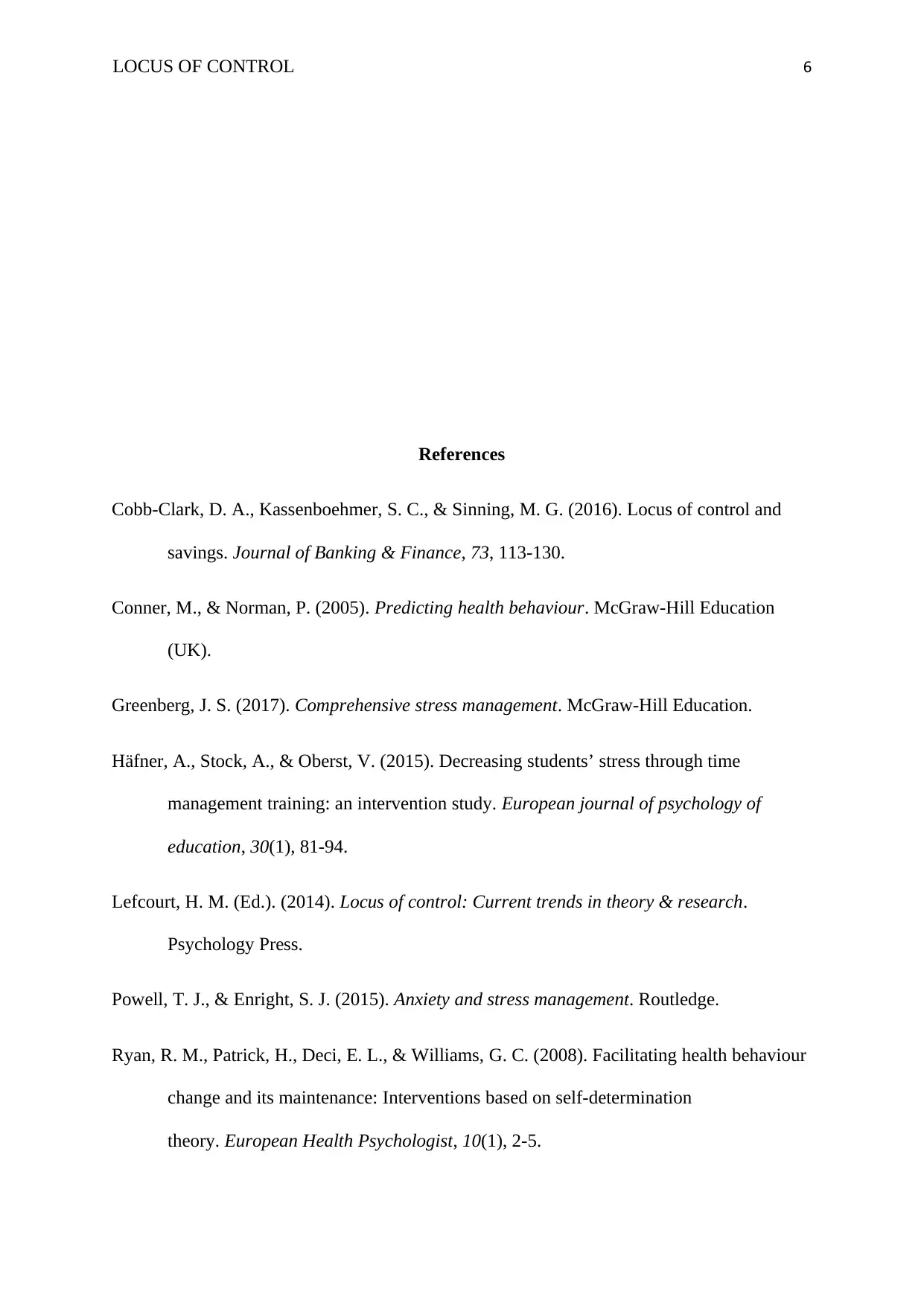
LOCUS OF CONTROL 6
References
Cobb-Clark, D. A., Kassenboehmer, S. C., & Sinning, M. G. (2016). Locus of control and
savings. Journal of Banking & Finance, 73, 113-130.
Conner, M., & Norman, P. (2005). Predicting health behaviour. McGraw-Hill Education
(UK).
Greenberg, J. S. (2017). Comprehensive stress management. McGraw-Hill Education.
Häfner, A., Stock, A., & Oberst, V. (2015). Decreasing students’ stress through time
management training: an intervention study. European journal of psychology of
education, 30(1), 81-94.
Lefcourt, H. M. (Ed.). (2014). Locus of control: Current trends in theory & research.
Psychology Press.
Powell, T. J., & Enright, S. J. (2015). Anxiety and stress management. Routledge.
Ryan, R. M., Patrick, H., Deci, E. L., & Williams, G. C. (2008). Facilitating health behaviour
change and its maintenance: Interventions based on self-determination
theory. European Health Psychologist, 10(1), 2-5.
References
Cobb-Clark, D. A., Kassenboehmer, S. C., & Sinning, M. G. (2016). Locus of control and
savings. Journal of Banking & Finance, 73, 113-130.
Conner, M., & Norman, P. (2005). Predicting health behaviour. McGraw-Hill Education
(UK).
Greenberg, J. S. (2017). Comprehensive stress management. McGraw-Hill Education.
Häfner, A., Stock, A., & Oberst, V. (2015). Decreasing students’ stress through time
management training: an intervention study. European journal of psychology of
education, 30(1), 81-94.
Lefcourt, H. M. (Ed.). (2014). Locus of control: Current trends in theory & research.
Psychology Press.
Powell, T. J., & Enright, S. J. (2015). Anxiety and stress management. Routledge.
Ryan, R. M., Patrick, H., Deci, E. L., & Williams, G. C. (2008). Facilitating health behaviour
change and its maintenance: Interventions based on self-determination
theory. European Health Psychologist, 10(1), 2-5.
⊘ This is a preview!⊘
Do you want full access?
Subscribe today to unlock all pages.

Trusted by 1+ million students worldwide
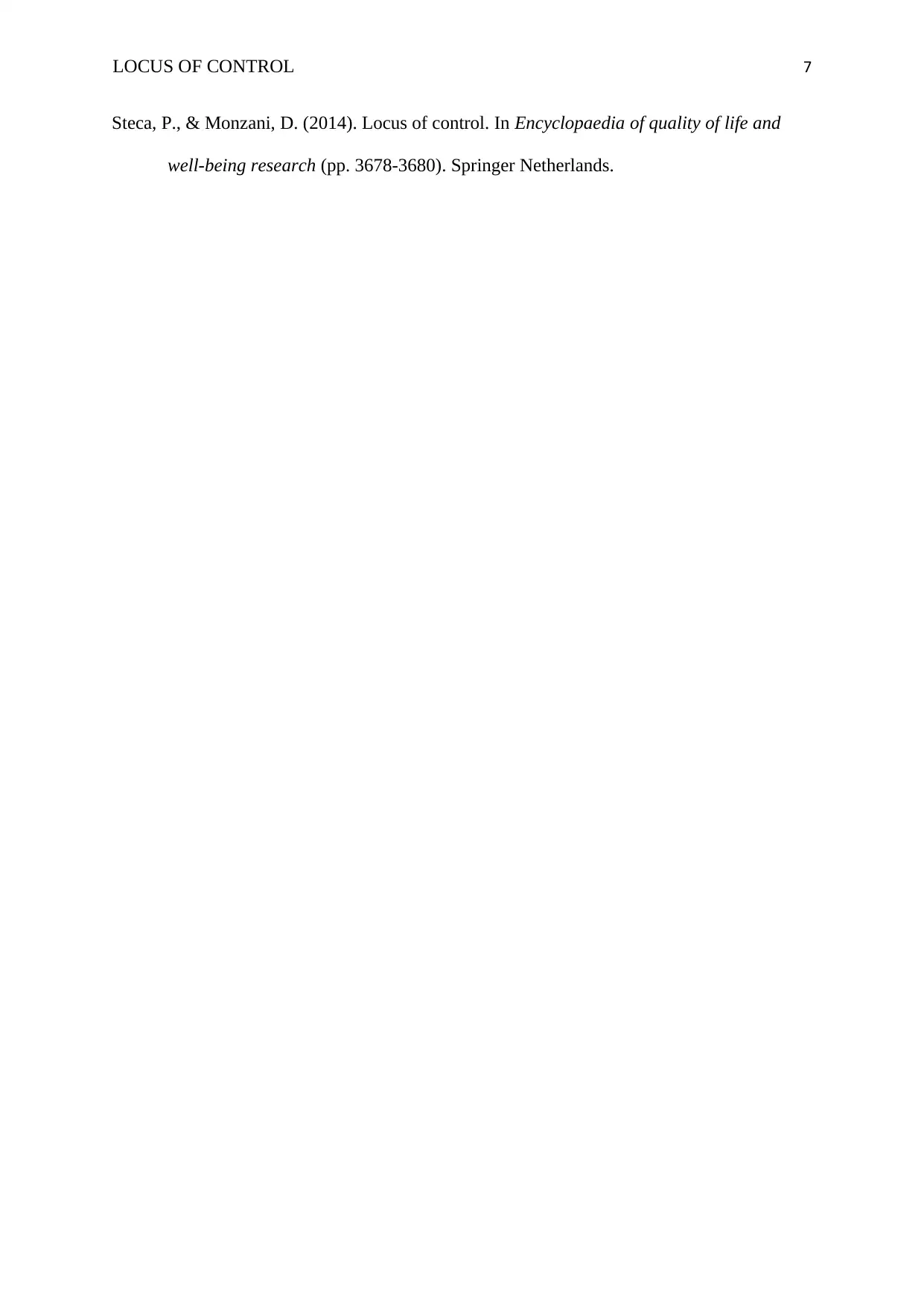
LOCUS OF CONTROL 7
Steca, P., & Monzani, D. (2014). Locus of control. In Encyclopaedia of quality of life and
well-being research (pp. 3678-3680). Springer Netherlands.
Steca, P., & Monzani, D. (2014). Locus of control. In Encyclopaedia of quality of life and
well-being research (pp. 3678-3680). Springer Netherlands.
1 out of 7
Related Documents
Your All-in-One AI-Powered Toolkit for Academic Success.
+13062052269
info@desklib.com
Available 24*7 on WhatsApp / Email
![[object Object]](/_next/static/media/star-bottom.7253800d.svg)
Unlock your academic potential
Copyright © 2020–2026 A2Z Services. All Rights Reserved. Developed and managed by ZUCOL.





